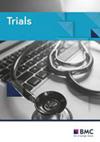非甾体抗炎药对治疗心脏手术术后疼痛的影响:一项多中心、随机对照、双盲试验(KETOPAIN 研究)
IF 2
4区 医学
Q3 MEDICINE, RESEARCH & EXPERIMENTAL
引用次数: 0
摘要
非甾体类抗炎药(NSAID)被推荐用于治疗急性术后疼痛,作为减少阿片类药物使用、缓解疼痛和减少非心脏手术慢性疼痛的多模式策略的一部分。然而,由于非甾体抗炎药的潜在不良反应,包括出血增加和急性肾损伤(AKI),心脏手术中的非甾体抗炎药引起了极大的关注。我们假设,考虑到禁忌症,非甾体抗炎药在心脏手术术后早期能有效止痛且安全。KETOPAIN试验是一项前瞻性、双盲、1:1比例、与安慰剂对比的多中心试验,对238名计划接受心脏手术的患者进行随机分组。所有参与者都将获得书面同意。纳入标准是在心肺旁路(CPB)下接受择期心脏手术的 18 岁以上患者。患者将被分配到干预组(酮洛芬)(119 人)或对照组(安慰剂)(119 人)。干预组患者除接受标准治疗外,还将接受非甾体抗炎药(酮洛芬)治疗,剂量为每次 100 毫克,时间为 12 小时后 48 小时。对照组除接受标准治疗外,还将在术后 48 小时内每 12 小时服用一次非甾体抗炎药安慰剂。将进行意向治疗分析。主要终点是手术结束 24 小时后休息时的术后急性疼痛强度。疼痛程度将使用无数评分量表进行评估。次要终点是术后胸部理疗时咳嗽时的疼痛、术后第7天前的疼痛、第3天和第7天之间的疼痛轨迹、术后48小时内阿片类药物的累积用量、恶心和呕吐、术后7天内肺部并发症的发生率、3个月时的神经性疼痛以及3个月时的生活质量。非甾体抗炎药是环氧化酶的非选择性、可逆性抑制剂,在多模式疼痛治疗方法中发挥作用。虽然有建议支持在大型非心脏手术中使用非甾体抗炎药,但最近的指南并不赞成在心脏手术中使用非甾体抗炎药。但这是基于低质量的证据。心脏手术患者使用非甾体抗炎药的主要顾虑是可能会增加术后出血或 AKI。然而,很少有研究支持在没有出血和/或 AKI 风险的情况下使用非甾体抗炎药。此外,在最近的一项法国调查中,许多麻醉师表示在心脏手术中使用非甾体抗炎药。迄今为止,还没有一项大型随机研究对非甾体抗炎药治疗心脏手术术后疼痛的疗效进行评估。本研究的预期结果是通过使用非甾体抗炎药等多模式策略改善心脏手术急性术后疼痛的治疗。ClinicalTrials.gov NCT06381063。注册日期:2024 年 4 月 24 日。本文章由计算机程序翻译,如有差异,请以英文原文为准。
Effect of non-steroidal anti-inflammatory drugs on the management of postoperative pain after cardiac surgery: a multicenter, randomized, controlled, double-blind trial (KETOPAIN Study)
Non-steroidal anti-inflammatory drugs (NSAIDs) are recommended for the management of acute postoperative pain as part of a multimodal strategy to reduce opioid use, relieve pain, and reduce chronic pain in non-cardiac surgery. However, significant concerns arise in cardiac surgery due to the potential adverse effects of NSAID including increased bleeding and acute kidney injury (AKI). We hypothesized that NSAIDs are effective against pain and safe in the early postoperative period following cardiac surgery, taking contraindications into account. The KETOPAIN trial is a prospective, double blind, 1:1 ratio, versus placebo multicentric trial, randomizing 238 patients scheduled for cardiac surgery. Written consent will be obtained for all participants. The inclusion criterion is patients more than 18 years old undergoing for elective cardiac surgery under cardiopulmonary bypass (CPB). Patients will be allocated to the intervention (ketoprofen) group (n = 119) or the control (placebo) group (n = 119). In the intervention group, in addition to the standard treatment, patients will receive NSAIDs (ketoprofen) at a dose of 100 mg each 12 h 48 h after. The control group, in addition to the standard treatment, will receive a placebo of NSAIDs every 12 h for 48 h after surgery. An intention-to-treat analysis will be performed. The primary endpoint will be the intensity of acute postoperative pain at rest at 24 h from the end of surgery. Pain will be assessed using the numerous rating scale. The secondary endpoints will be postoperative pain on coughing during chest physiotherapy, postoperative pain until day 7, the pain trajectory between day 3 and day 7, cumulative opioid consumption within 48 h after surgery, nausea and vomiting, the occurrence of postoperative pulmonary complications within the first 7 days after surgery, neuropathic pain at 3 months, and quality of life at 3 months. NSAIDs function as non-selective, reversible inhibitors of the cyclooxygenase enzyme and play a role in a multimodal pain management approach. While there are recommendations supporting the use of NSAIDs in major non-cardiac surgery, recent guidelines do not favor their use in cardiac surgery. However, this is based on low-quality evidence. Major concerns regarding NSAID use in cardiac surgery patients are potential increase in postoperative bleeding or AKI. However, few studies support the possible use of NSAIDs without the risk of bleeding and/or AKI. Also, in a recent French survey, many anesthesiologists reported using NSAIDs in cardiac surgery. To date, no large randomized study has been conducted to evaluate the efficacy of NSAIDs in the management of postoperative pain in cardiac surgery. The expected outcome of this study is an improvement in the management of acute postoperative pain in cardiac surgery with a multimodal strategy including the use of NSAIDs. ClinicalTrials.gov NCT06381063. Registered on April 24, 2024.
求助全文
通过发布文献求助,成功后即可免费获取论文全文。
去求助
来源期刊

Trials
医学-医学:研究与实验
CiteScore
3.80
自引率
4.00%
发文量
966
审稿时长
6 months
期刊介绍:
Trials is an open access, peer-reviewed, online journal that will encompass all aspects of the performance and findings of randomized controlled trials. Trials will experiment with, and then refine, innovative approaches to improving communication about trials. We are keen to move beyond publishing traditional trial results articles (although these will be included). We believe this represents an exciting opportunity to advance the science and reporting of trials. Prior to 2006, Trials was published as Current Controlled Trials in Cardiovascular Medicine (CCTCVM). All published CCTCVM articles are available via the Trials website and citations to CCTCVM article URLs will continue to be supported.
 求助内容:
求助内容: 应助结果提醒方式:
应助结果提醒方式:


